The right camping stove can make or break a camping trip. Whether you’re wild camping in the mountains or on the coast, or sitting round a portable firepit with a big group of friends, cooking and eating in the great outdoors should be fun. But even if the weather’s not on your side, it should at least be easy.
There is an ideal camping stove for every type of camping holiday, and we’ve tested a broad range in this review to find the best of what’s out there right now, new and established, so you can make an informed decision.
Jump to the best camping stoves:
Not sure where to start? Jump to our buyer's guide for information on the different types of camping stoves.
Reviews edited by Alice Tuffery
The best camping stoves for 2025
Lightweight/backpacking camping stoves
Jetboil Java Flash stove system
Best for backpacking
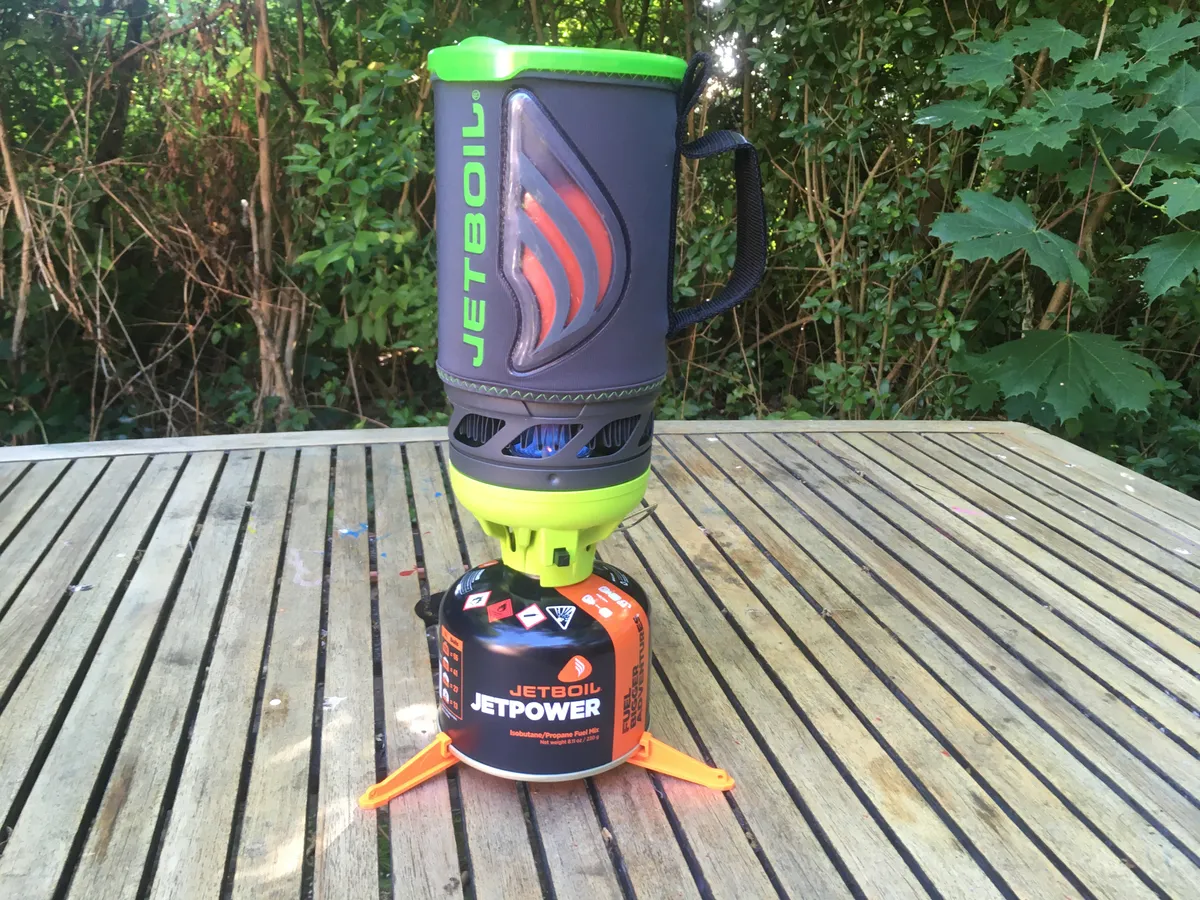
- RRP: £119
- Fuel type: EN417 gas cartridge
- Packed dimensions: 25.4 x 15.24 x 12.7 cm
- Weight: 40g
- Extra features: Plunger
Part-stove-part-cafetiere, the Jetboil Java Flash boils water in 100 seconds and comes with a plunger to make coffee for two. Impressively, the three strips on the side of the container turn orange as the water boils, so you know when it's ready; a great feature for fans of fun camping gadgets.
The Java Flash is readily available in most outdoor stores, compatible with standard 450g gas cartridges and it's easy to use as well. Other benefits include the lightweight, ergonomic and compact design, and the adjustable heat settings.
Pros: fast, powerful, well designed, fuel efficient
Cons: price
Read our full Jetboil Java Flash stove system review for more details.
Coleman Fyrestorm
Best for efficiency
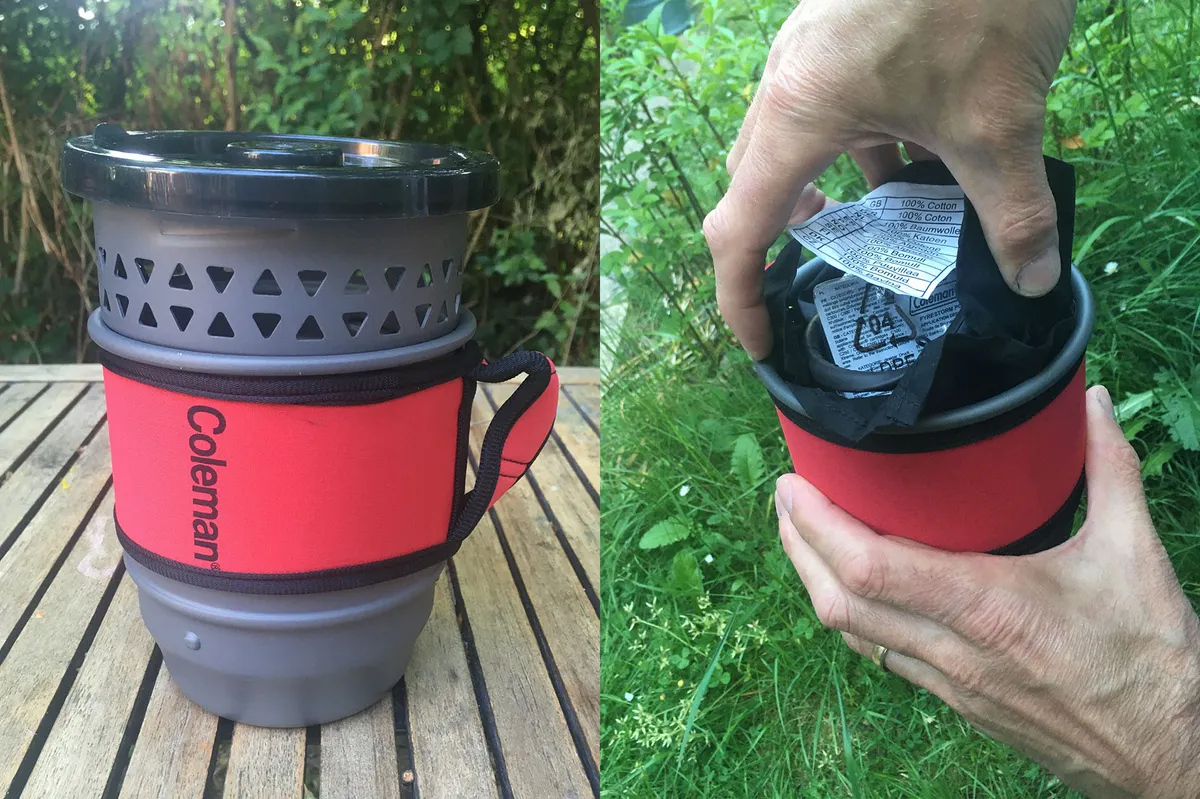
- RRP: £90
- Fuel type: standard EN417 gas cartridge
- Packed dimensions: 20.4 x 13.6cm pot
- Weight: 486g
- Extra features: fabric to wrap around stove and protect non-stick pot
Similar in design to the Jetboil, OEX Heiro and MSR Pocket Rocket, Coleman's Fyrestorm has built-in wind protection and an insulated handle, making it ideal for boiling water quickly. In real-world conditions with moderate wind, it boiled 500ml of water in three minutes, so there are faster stoves around. It's also hard to know when it's done, and you risk a steam burn by trying to take the lid off.
The capacity is 1.3L - more than similar models - but it's also bulkier.
The advantages are its extra-long gas cable, non-stick pot and lightweight design. For more details, read our full Coleman Fyrestorm review.
Pros: large capacity for stove type, effective windshield, powerful, fuel efficient
Cons: bulky, tricky lid, hard to know when water has boiled, sharp connector grooves
OEX Heiro solo stove system
Best for solo backpacking
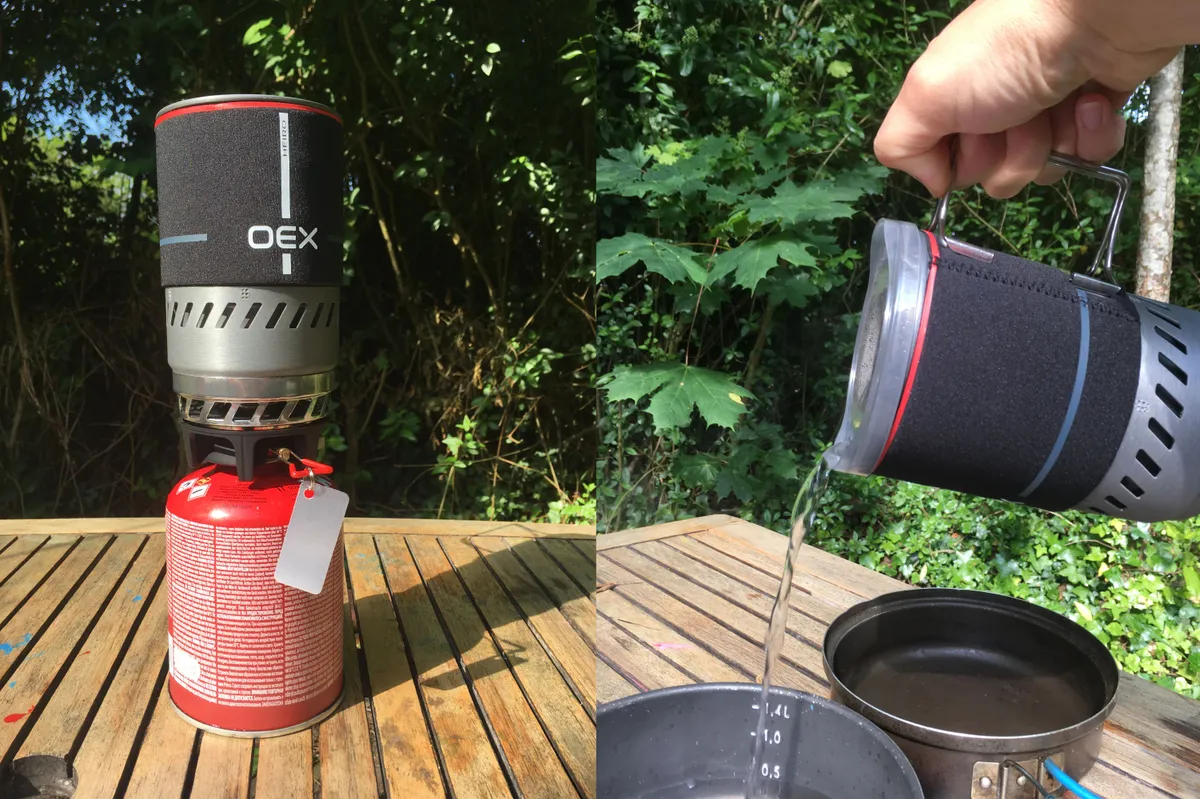
- RRP: £45
- Fuel type: screw-top butane/propane cannister (110g, 230g or 500g)
- Packed dimensions: 10cm x 15.5cm
- Weight: 370g
- Extra features: carry bag
Neat, lightweight and easy to use, the advantages of this stove are clear to see from the off. In design, it rivals the Jetboil, MSR Pocket Rocket and Coleman Fyrestorm as a solo camping stove.
We appreciated the windshield, and while the stove as a whole felt stable once we'd put it together, the thin folding handles weren't quite strong enough to twist off the pot. Instead, you can grip the neoprene-insulated pot, as it won't scold you. The lid also fell off during pouring, so there are a couple of design faults here.
On the plus side, this is a great-value camping stove, and it boils 500ml water in two minutes.
Pros: fast, great value, compact, easy assembly, fuel efficient, good wind protection
Cons: tricky handle, no boil indicator
For more information, read our full OEX Heiro solo stove system review.
Highlander Triplex camping stove
Best for wild campers
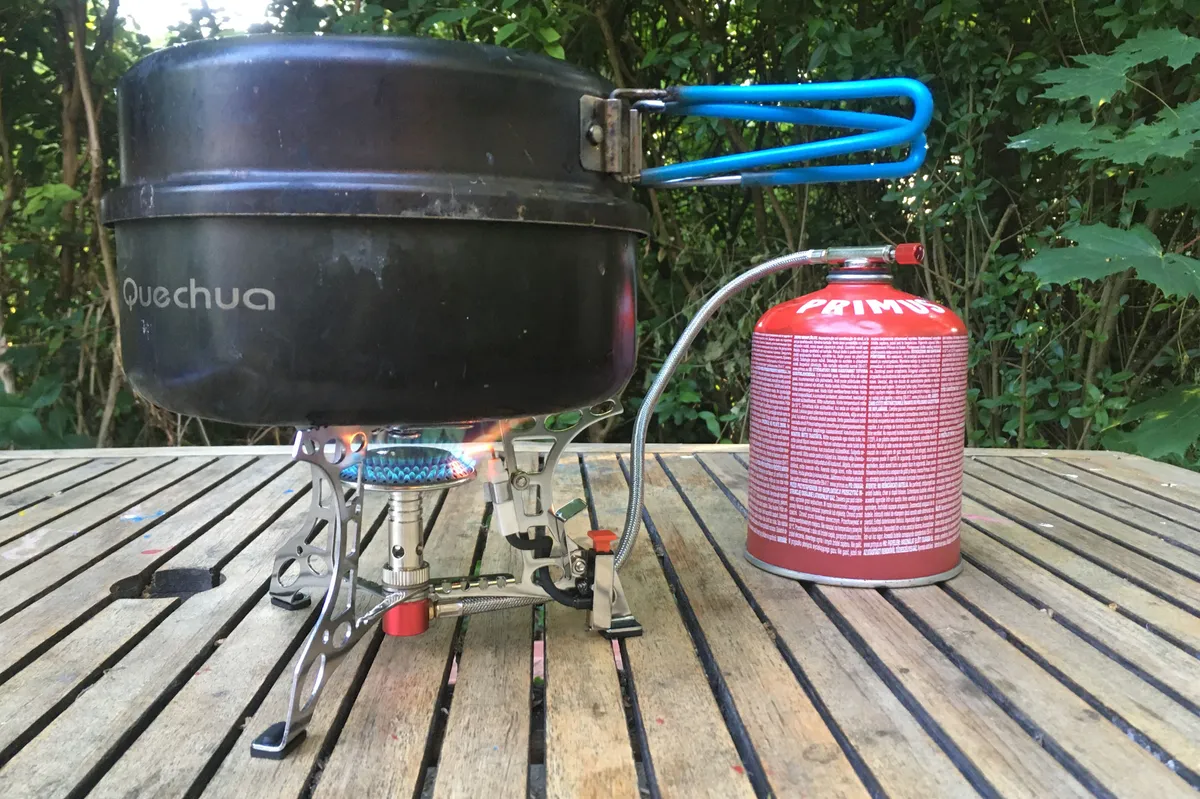
- RRP: £40
- Fuel type: EN417 gas cartridge
- Packed dimensions: 13cm x 11cm x 6.5cm
- Weight: 225g
- Extra features: carry bag
Simple, powerful and affordably-priced, Highlander's Triplex camping stove is a great option for backpackers on a budget. It's designed for solo use and folds up into a tiny black carry pouch.
The stove is easy to set up in under a minute, and boils 500ml of water in five minutes (tested during moderate wind conditions). We particularly appreciated the built-in ignition button, which means you don't have to risk burning yourself with a lighter in high winds.
Other big plus points include the grippy rubber leg pads for stability and the adjustable heat control dial.
Pros: compact, folds away neatly, lightweight, good value, powerful, built-in ignition
Cons: no wind protection, so not fuel efficient
Head to our full Highlander Triplex camping stove review.
Trangia 25 single ring cookset
Best for single-day hikes
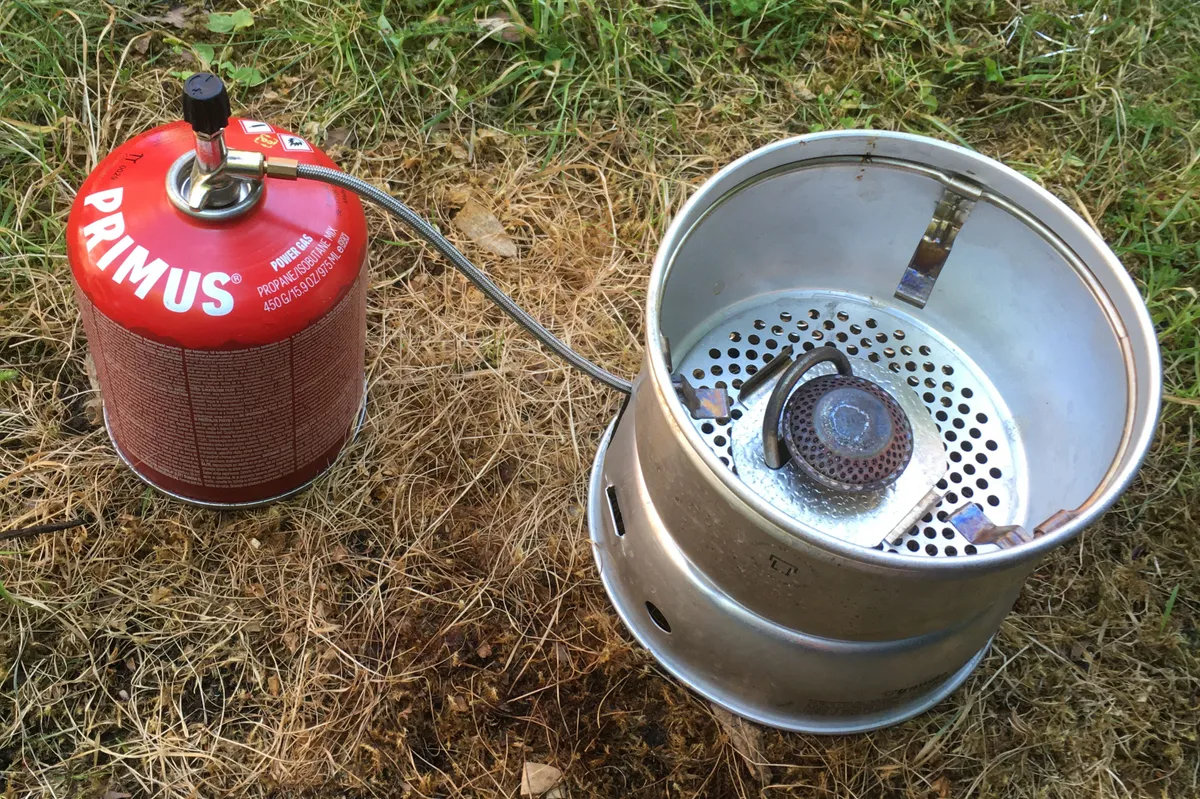
- RRP: £110
- Fuel type: spirit burner uses alcohol (eg methylated spirits); gas burner uses propane/butane gas cannister with screw-top valve
- Packed dimensions: diameter 18.5cm, height 10cm.
- Weight: 865g
- Extra features: frying pan, two saucepans, detachable handle; available in ultra-lightweight aluminium or non-stick coating
Seasoned campers will probably be familiar with Trangia. Here, all the bowls and pans stack together for easy storage, and while this set does come with a pan handle, there aren't any lids, so you'll need to use an upturned pan to boost the stove's efficiency.
You can use this set with a small spirit burner or a standard EN417 screw-on gas cartridge, but make sure you move fast once you've lit it or you'll risk burns. Then, use the dial to adjust the heat inside.
We'd recommend this as one of the best camping stoves for regular campers and festivalgoers, but if you don't want to spend more than £50, try Easy Camp's Storm Cooker.
Pros: lightweight, durable, comes with carry case, easy to use, stable
Cons: 500ml capacity, no pan lids, less compact than other stoves
Read our full Trangia 25 single ring cookset review.
Solid fuel stoves
Kelly Kettle Ultimate Base Camp Kit
Best for camping with a car
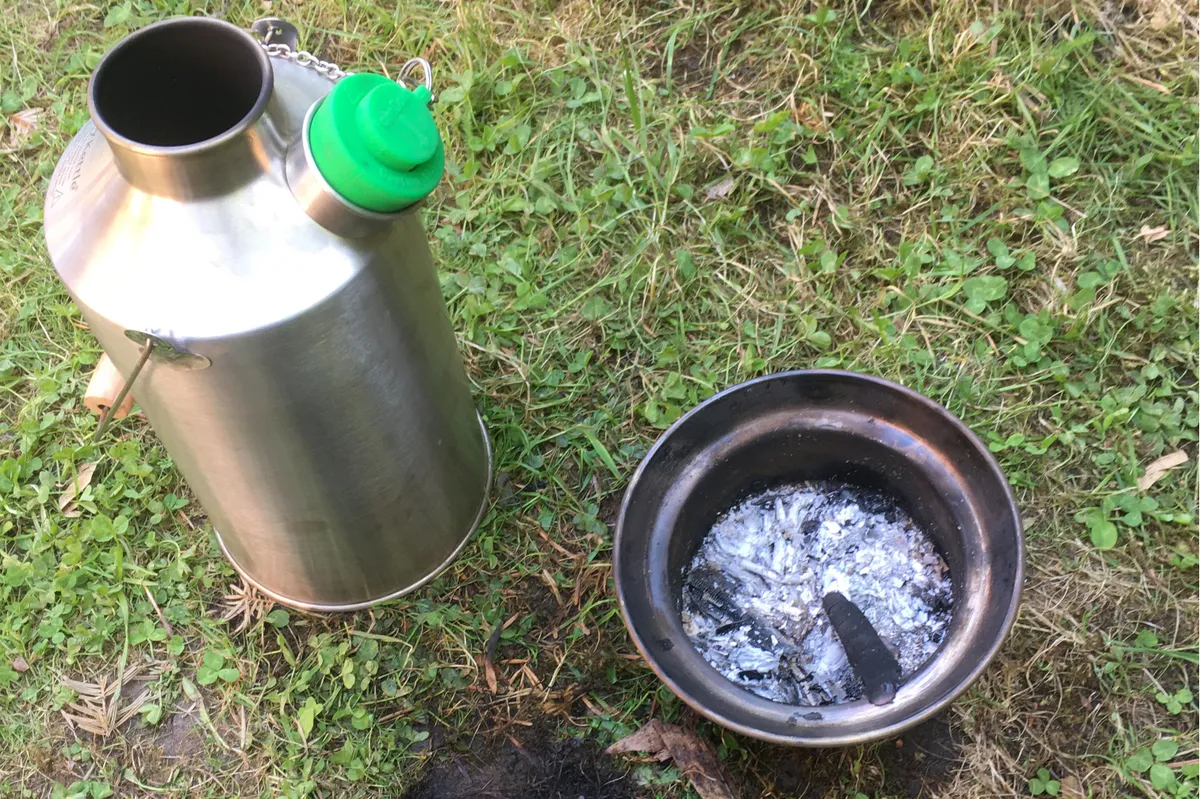
- RRP: £100
- Fuel type: natural materials
- Packed dimensions: height 33cm; diameter 18.5cm
- Weight: 1.16kg (stainless steel), or 0.8kg (anodised aluminium)
- Extra features: cooking pot, grill, shallow pan, two metal cups, two steel plates, pot support and ‘hobo stove’
An unfussy, survival-style design gives this stove the feel of Army-issue mess gear. It's named after its 19th-century inventor, Irish fisherman Patrick Kelly, and more recently has been sent to thousands of sheltering civilians in war-torn Ukraine.
The tubular 'kettle' sits above the fire pot, which you load with twigs, bark and leaves. It sucks in air through its ventilation holes to feed the flames and create a tunnel of heat - so don't be tempted to look down through the kettle!
Although the kit itself is fairly bulky, and comes with a pot, pan and griddle, you can save some weight as you won't need to bring a gas canister with you.
We found it performed well once lit, boiling 500ml of water in three minutes. Read our full Kelly Kettle review or see our tips on how to light the perfect fire when you're ready to get started.
Pros: no gas required, lightweight, quick and efficient, easy to use
Cons: bulky if backpacking, harder to get going in rain, potentially dangerous
Highlander solid fuel cooker
Best for survival challenges
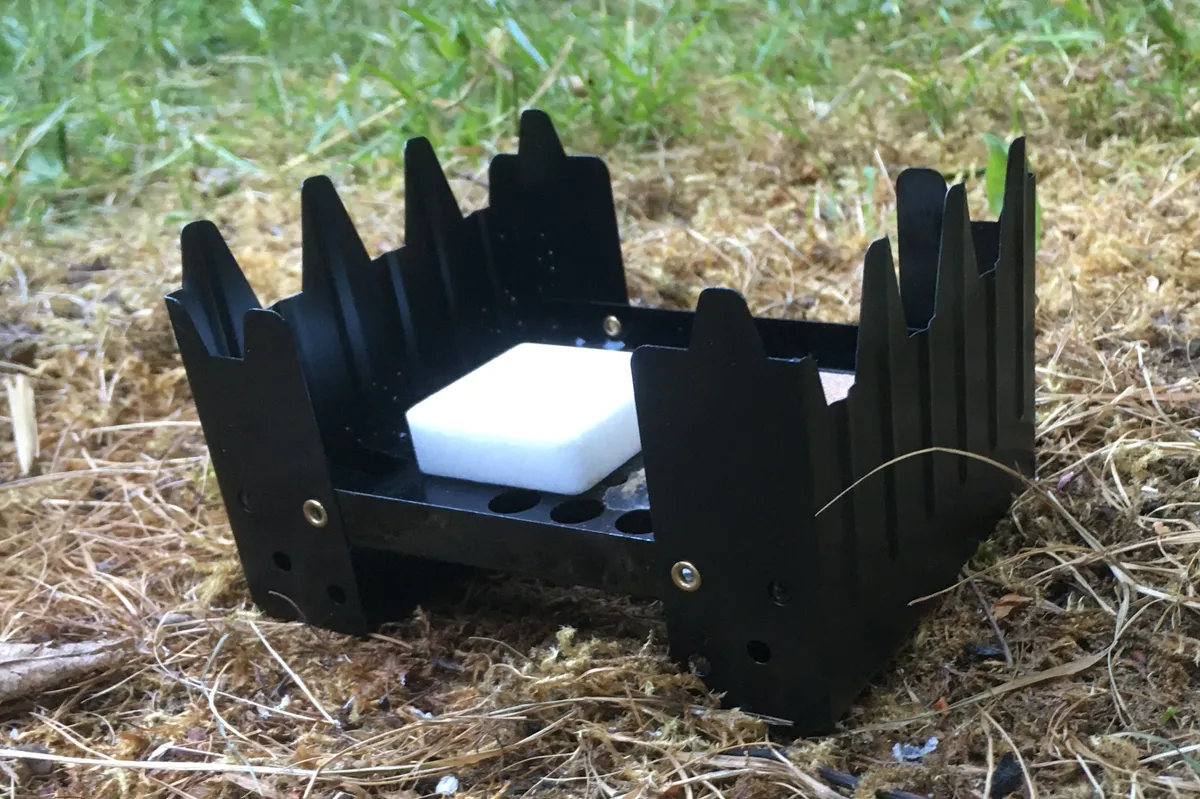
- RRP: £5
- Fuel type: Hexamine solid fuel tablets
- Packed dimensions: 12 cm x 9.5 cm x 2.5 cm
- Weight: 200g
- Extra features: none
If you're on a serious budget, you might want to consider Highlander's solid fuel cooker - but it's not without flaws.
Putting it together is easy; just unfold it into the H-shaped sand and add a fuel tablet (the pack comes with four). They take four minutes to boil 500ml of water, so they're slower than gas stoves.
The lack of wind protection does cause some safety issues once you've lit the tablet. You can't touch the stove to move it, and then removing a cooking pan is tricky too - even with oven gloves on. Admittedly, you could use it behind a wind-proof shelter, but you'd need to make one yourself each time.
Pros: very cheap, compact, lightweight
Cons: impractical, hard to control heat, invites injury, requires wind shelter
You can find out more in our full review of the Highlander solid fuel cooker.
Family and leisure camping stoves
Petromax Atago stove
Best for family camping
SQUIRREL_TEXT_13077105
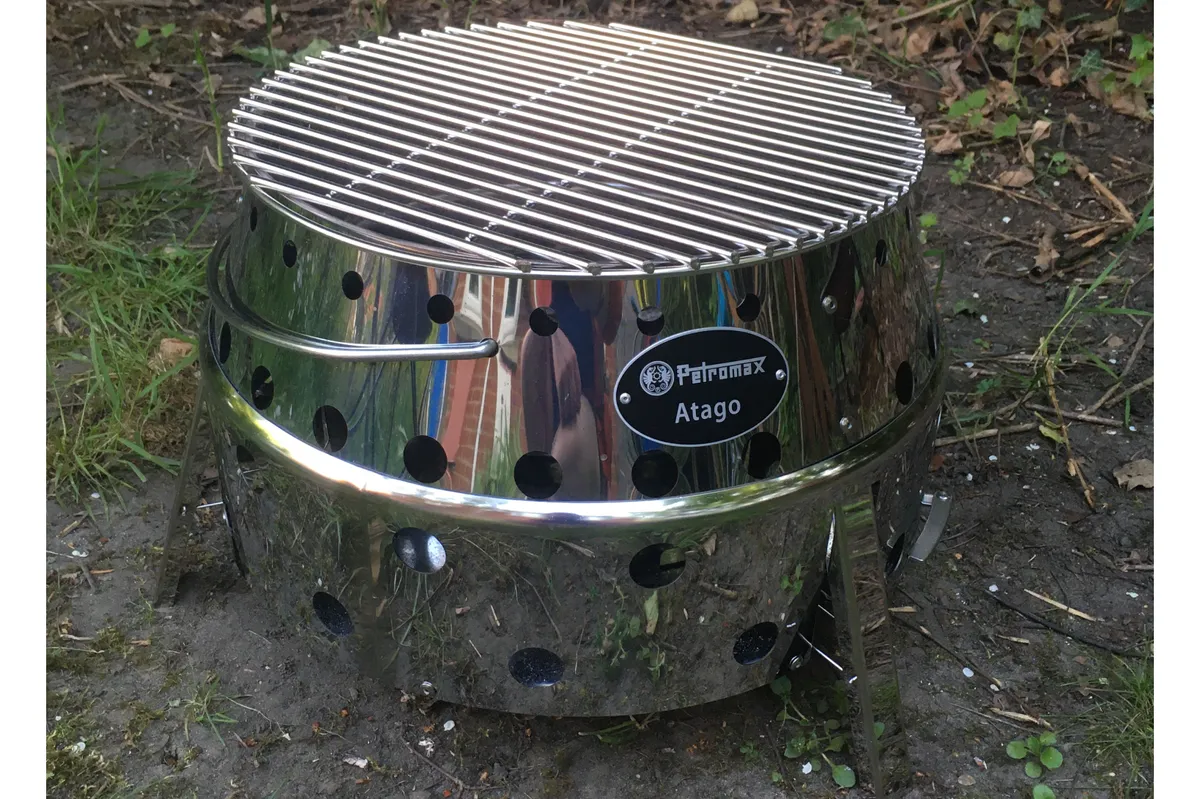
- RRP: £230
- Fuel type: charcoal, wood
- Packed dimensions: 34cm diameter, 14cm height
- Weight: 6.1kg
- Extra features: comes with grill – you’ll need to invest in cookware
Made from sturdy, rust-resistant stainless steel and coming in at just over 6kg, this camping stove is a high-quality bit of kit, best-suited to leisure campers and fans of traditional outdoor cooking. It's not the fastest stove on the market - it takes around 20 minutes to heat up and then five minutes for the Dutch oven to boil water - but it's a great option for relaxed evenings outdoors.
The stove doubles as a grill and firepit, so you can continue using it throughout the evening, and you can slot Petromax's Dutch oven inside to cook stews, pies, bread and even pizza.
What's more, set-up is a dream. Just pull up the handle to expand the stove and pop out the three sturdy legs. We opted to test this stove with charcoal briquettes, which let you control the heat better than with wood, and the ventilation holes do a great job of sucking up air around the drum.
Pros: no gas required, attractive, excellent design, versatile
Cons: heavy, takes time to heat up, scorches grass, cost, fuel is bulky
Want to know more? Take a look out our review of the Petromax Atago stove.
SQUIRREL_13077105
Outwell Olida double stove
Best for short leisure trips
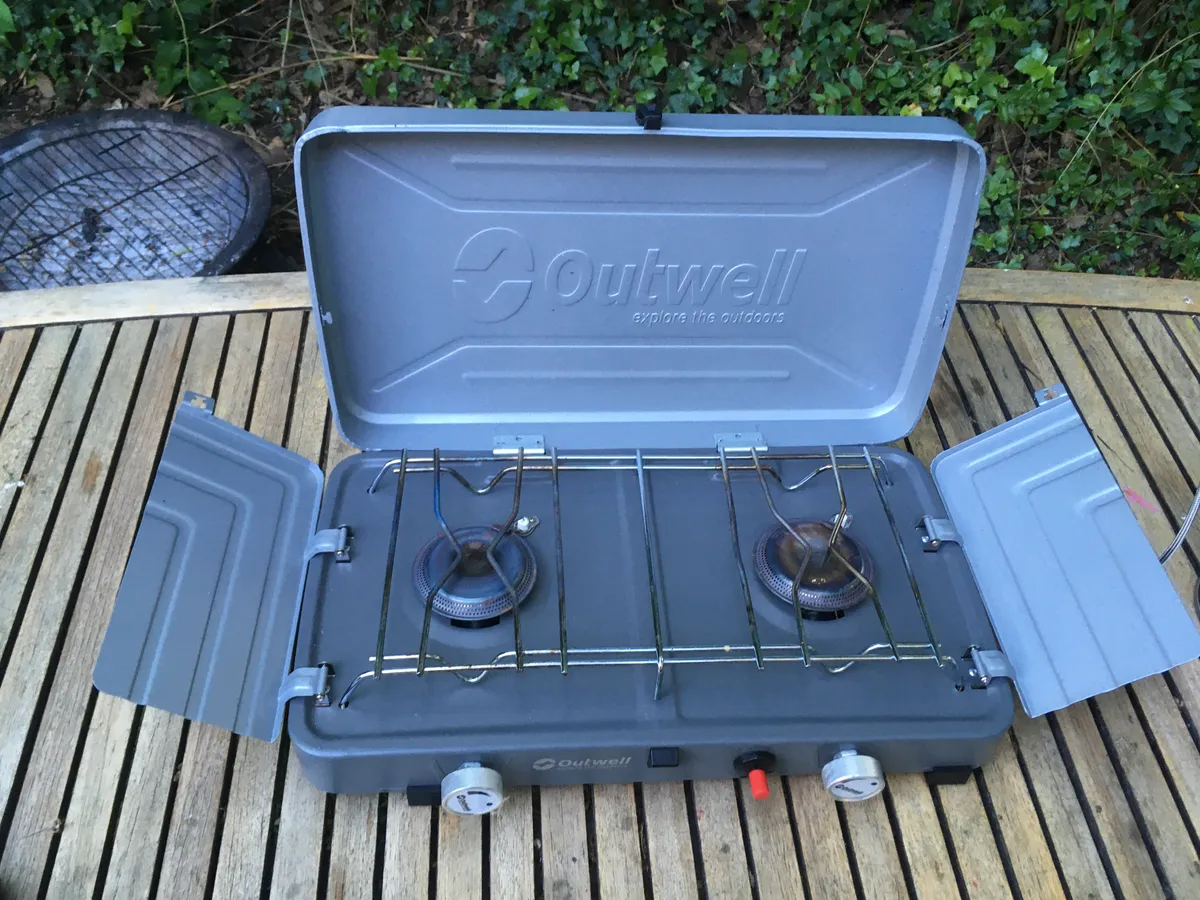
- RRP: £70
- Fuel type: screw-on gas cartridge weighing 250g or 500g.
- Packed dimensions: 47.5 x 32 x 11.5 cm
- Weight: 4.4kg
- Extra features: none
Outwell's Olida gas stove can offer two cooking burners, good heat control and a budget-friendly price tag, but does feel rather flimsy out of the box. It has two clip-on windshields for protection, but they won't save you in high winds.
We also struggled to pack it down neatly after testing; there's no carry case for easy storage and transportation.
As for performance, the Olida takes five minutes to boil 500ml of water in a lidded pan, so it's not the fastest stove out there either. All in all, we'd be tempted to spend a little more for a slightly sturdier and more ergonomic camping stove - we rated Campingaz's Kitchen 2 Grill and Go.
Pros: good power when working, lightweight
Cons: not durable, windshield ineffective, no carry case – box is bulky
Read our full Outwell Olida double stove review.
Campingaz Kitchen 2 Grill and Go
Best high-quality camping stove
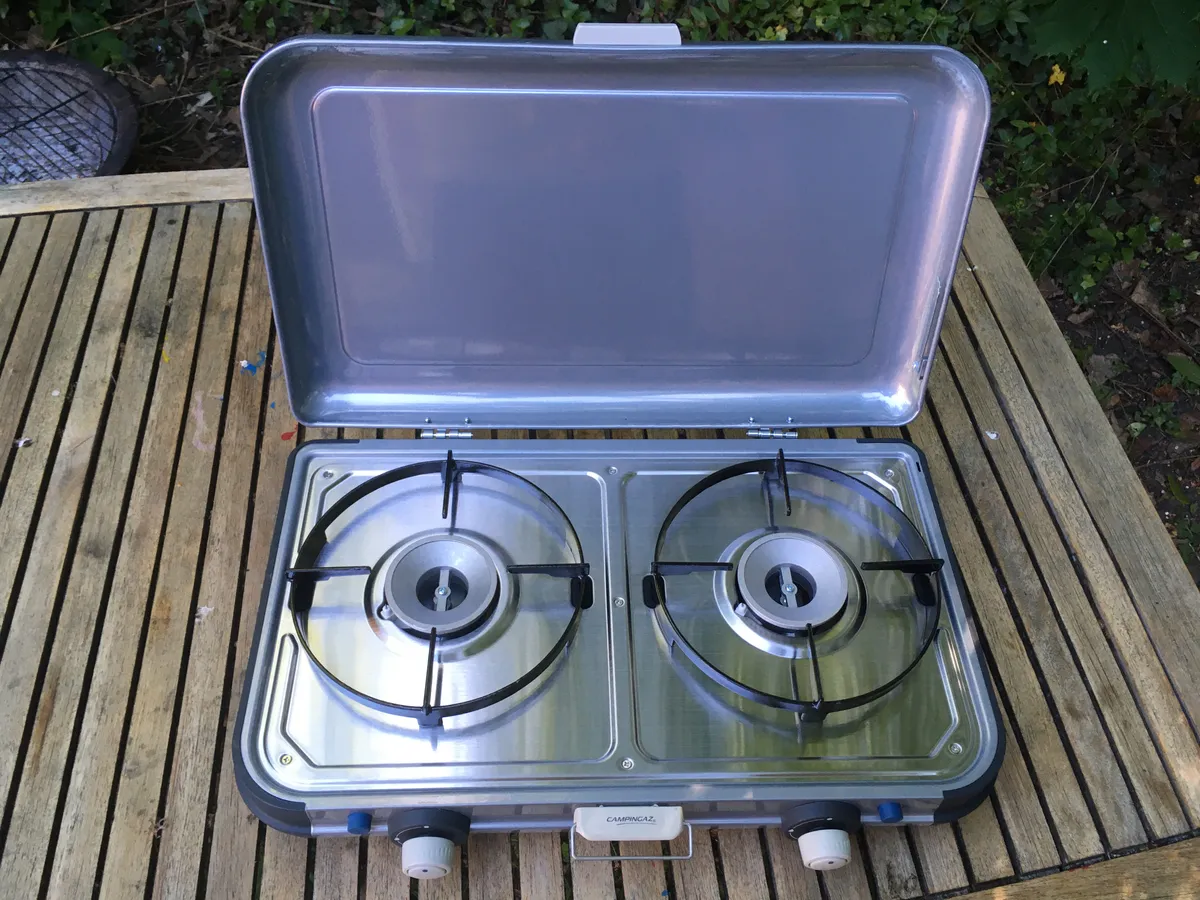
- RRP: £150
- Fuel type: either Campingaz 907 or 904 gas cylinder or CV470+ Easy Clic Cartridge; make sure you have the right regulator before setting off
- Packed dimensions: 49 x 35 x 10cm
- Weight: 5.3kg
- Extra features: grill and griddle, carry bag
While Campingaz's dual burner stove is priced higher than similar alternatives, we'd say its high-quality construction, clever features and versatility makes it worth the extra investment.
Thanks to the smart, sleek design, this stove looks great and easily packs away into its handy carry bag for fuss-free storage. The knobs are great quality and Campingaz has built in a safe hold in each corner to help you avoid burnt fingers when pressing the ignition.
The set comes with a griddle and a flatplate grill for versatility. We were also impressed with its adjustable heat control, which lets you boil 500ml of water in two and a half minutes, as well as the windshield, which we tested on a moderately windy day.
Pros: well designed, quality, ergonomic feel, versatile, carry case
Cons: price, not compact
More in our full Campingaz Kitchen 2 Grill and Go review.
Halfords Portable Gas Stove
Best for festivals and first-time leisure campers
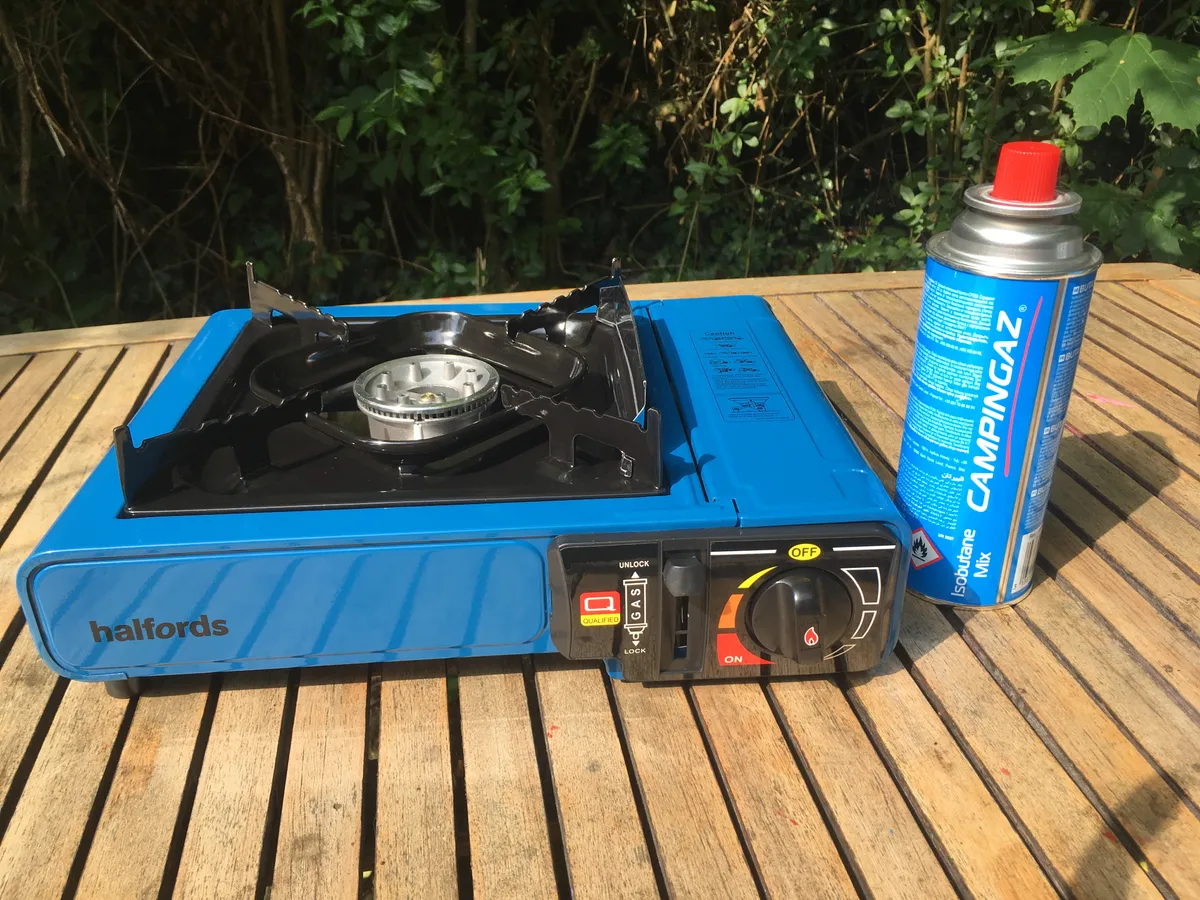
- RRP: £18
- Fuel type: butane push in A4 gas cartridge
- Packed dimensions: carry case = 11.8cm x 37.3cm x 37cm at widest point
- Weight: 1.461kg; 2.055kg with carry case
- Extra features: carry case
Priced at just £18, this basic camping stove is a favourite among students, festivalgoers and budget campers. In fact, Halfords has been making it for decades. While it's probably too bulky for backpacking and not versatile enough for family camping, it's worth considering if you're after a simple, budget-friendly stove.
Set-up is easy and involves slotting your gas cartridge into the canister holder inside the stove. It uses Butane push-in A4 gas cartridges, which are less environmentally friendly than bigger versions, and you'll need a few if you're away for more than a couple of days.
On one side you'll find a little windshield, and in moderate wind we boiled 500ml of water in just two minutes, 20 seconds, which puts it next to the Jetboil and OEX Heiro for power, although it's less fuel efficient. There's also a carry case for storage.
Pros: cheap, simple, user friendly, carry case, powerful
Cons: bulky, not much wind protection, not very fuel efficient
Which camping stove is best?
There are three types of camping stove – take a moment to read the pros and cons of each before you buy.
Camping gas stoves
Camping gas stoves are the most common, available widely in outdoors shops and even some supermarkets. They take a mix of butane/propane, attached either by a screw-on or click-on cartridge, usually 450g worth. They have the advantage of being lightweight, portable and easy to get hold of; however it can be tricky knowing how much gas you’ve got left.
Stoves with more than one burner will usually take a larger refillable cannister, which can be bought and refilled at some garages. This is better for the environment and lasts longer – you just have to make sure you buy a regulator to fit.
Liquid fuel stove
Liquid fuel stoves burn methylated spirits or paraffin. They’re easy to light, but take longer to cook as they don’t burn very hot. The Trangia can be bought with one of these, however we tested the gas cartridge version as that is more common and easier to control.
Solid fuel stoves
Solid fuel stoves such as the Kelly Kettle or the Petromax Atago can take dry twigs, pine cones, strips of cardboard packaging and even a bit of candle wax to get the fire going. The Petromax crosses over into portable firepit territory, as it can be fuelled with charcoal briquettes and used as a grill or portable oven, and then loaded up with logs after dinner has been made.
We also tested the very basic £5 Highlander stove, which takes Hexamine tablets as a heat source.
It’s worth remembering that ultra-compact and light backpacking stoves, like the Highlander, Triplex or Jetboil are often essentially water heaters for the trail, used for making a dehydrated meal rather than for frying eggs. The value is in how quickly they can boil the water and how they perform in windy conditions.
Other stoves come with heat exchanger systems: little collars that basically help trap the heat between the flame and the pot, making them more fuel efficient.
Can you use an outdoor camping stove indoors?
Absolutely not, under any circumstances. Fire risk aside, all stoves release carbon monoxide, which could poison you.
Stocking up for your next adventure? See our selection of the best camping kettles you can buy today.
